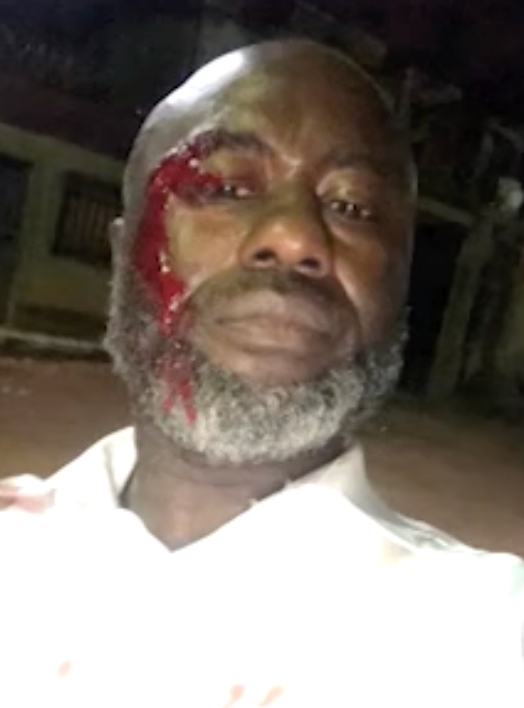
Cameroon’s Équinoxe TV broadcast an empty television studio along with the word “censored” to protest the regulator’s ban on its Sunday politics show. (Screenshot: YouTube/Équinoxe TV)
CPJ Reports:
Dakar, October 2, 2024—After a month of seeing an empty television studio with the word “censored” splashed across the screen, Cameroonians are finally able to watch Équinoxe TV’s flagship Sunday politics show “Droit de Réponse” again.
The privately owned station fell foul of Cameroon’s regulatory National Communication Council (NCC), which judged it to have harmed the reputations of two ministers in the government of 91-year-old President Paul Biya, who has ruled the Central African country since 1982. The show and its presenter Duval Fangwa were suspended for one month. When Équinoxe TV broadcast a replacement Sunday show, “Le Débat 237,” the NCC swiftly banned that too.
Despite the return of Droit de Réponse, the station’s difficulties are far from over.
Two Équinoxe TV political journalists told CPJ that they had received death threats by phone and been threatened with arrest in connection with their work.
“Every day, when I leave my house, I know that the worst can happen,” said one, who does not feel safe despite relocating. The other journalist has been in hiding since early August. Both declined to be named, citing safety concerns.
Attacks on the press have escalated as Cameroon prepares for elections in 2025 that could see Biya — one of the world’s longest serving presidents — win another seven-year term. Tensions have been exacerbated by the delay of parliamentary and local elections until 2026, which Biya’s opponents fear will strengthen his hand in the presidential vote.
“The reduction of freedom of expression and the media has begun. Journalists are censoring themselves under the instructions of their bosses or editors,” Marion Obam, president of the National Union of Journalists of Cameroon, told CPJ.
Obam condemned as an “attempt to muzzle the press” a July 16 local government order banning from Mfoundi department, which includes the capital Yaoundé, anyone who “dangerously insults” government institutions or officials or takes action that could “lead to serious disturbances to public order.” Emmanuel Mariel Djikdent, prefect of Mfoundi department, said he was concerned about “the statements of certain guests on television or in radio studios.”
Djikdent was swiftly backed up by communication minister René Sadi, who condemned an “upsurge in the use of abusive language” against state institutions and called for “restraint.”
CPJ has since documented the following:
- August 8
The NCC suspended the privately owned newspaper Première Heure, its reporter Alain Balomlog, and publishing director Jeremy Baloko for one month for failing to “cross-check and balance” allegations of mismanagement by regional agriculture delegate Jean Claude Konde. - August 13
Police sealed the doors of RIS Radio following the NCC’s August 8 order to suspend broadcasting and to stop station manager Sismondi Barlev Bidjocka practicing journalism, both for a period of six months. The NCC said that Bidjocka aired “unfounded and offensive statements” about the powerful Ferdinand Ngoh Ngoh, Secretary General of the Presidency, on July 22.

Emmanuel Ekouli (Screenshot: Facebook/Équinoxe TV)
- August 22
La Voix du Centre editor Emmanuel Ekouli was beaten by three men on a motorcycle in Yaoundé who stole his laptop, phone, and recording equipment. He was similarly attacked by three men on a motorcycle on July 9. Ekouli has received threats over his journalism and work with the press freedom organization Reporters Without Borders investigating the 2023 murder of journalist Martinez Zogo, according to five screenshots reviewed by CPJ. La Voix du Centre reporter Guy Modeste Dzudie told CPJ that he and Ekouli had also received threatening calls and messages over a June report on corruption in an inheritance case. - August 28
Amadou Vamoulké, former managing director of the state-owned Cameroon Radio and Television, was sentenced to 20 years in prison for embezzlement. The 73-year-old has been jailed since 2016 and was given a 12-year sentence in 2022 on a separate embezzlement charge. CPJ believes his imprisonment is in reprisal for his journalistic independence in the face of government directives.

Amadou Vamoulké (Photo: credit withheld)
- September 4
Police arrested Le Zénith reporter Stéphane Nguema Zambo while he was attending an appointment related to his investigation into embezzlement in the Ministry of Secondary Education, Le Zénith’s publishing director Zacharie Flash Ndiomo told CPJ. Zambo was threatened and coerced into publishing a Facebook post recanting his findings before being released on September 6, Ndiomo said.
“We are going through a difficult period,” said François Mboke, president of the Network of Press Owners of Cameroon (REPAC). “There are risks for those who want to remain professional.”
NCC spokesman Denis Mbezele told CPJ that the regulator’s sanctions were to remind the media to act responsibly.
Police spokesperson Joyce Cécile Ndjem declined to respond unless CPJ came to her office in Yaoundé.
CPJ’s calls to request comment from the office of the Presidency, the Ministry of Communication, the Ministry of Agriculture, the Ministry of Secondary Education, and Mfoundi Prefecture were not answered.


